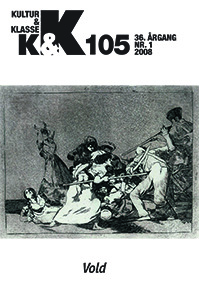Når værk bliver til vold
DOI:
https://doi.org/10.7146/kok.v36i105.22041Nøgleord:
Værk, vold, litteratur, tegneserier, islam, muslimer, tysk terrorisme, 70erne, kunst, politik, religionResumé
When Work is Violence:
Drawing on examples as divergent as current Muslim responses to the Danish cartoons and German terrorism in the 70s, this article aims to show how a closed alliance between art, politics and religion carries the risk of inducing violence which, among other things, annuls the function of art as being inherently ambiguous.
It is argued that the function of art in Islam is bound up with the inviolable authority of the prophet and is therefore basically unable to fulfil satiric purposes. Although satire and laughter were also confined to unofficial activities under the Roman Church in medieval times, it is claimed, along the lines of Bakhtin, that a ‘culture of laughter’ actually did survive in the European history of art and paved the way for the appreciation of the potential of satirical critique. Following Benjamin, it is further claimed that the post-auratic function of art joined up with the revolutionary hope for a new aesthetics of life contrary to the fragmentary world of urban capitalism. Finally, as its major case, the article discusses the sliding of aesthetic provocation into political activism in 70s Germany resulting in Urban terrorism. In this case, the function of art once again falls back into a totalitarian critique which merely acknowledges a singular picture of the world. In conclusion, it is pointed out that aesthetic expressions are only imbued with an anti-violent vitality due to a non-condemning, ambiguous openness.
Downloads
Publiceret
Citation/Eksport
Nummer
Sektion
Licens
Tidsskriftet følger dansk ophavsret.





